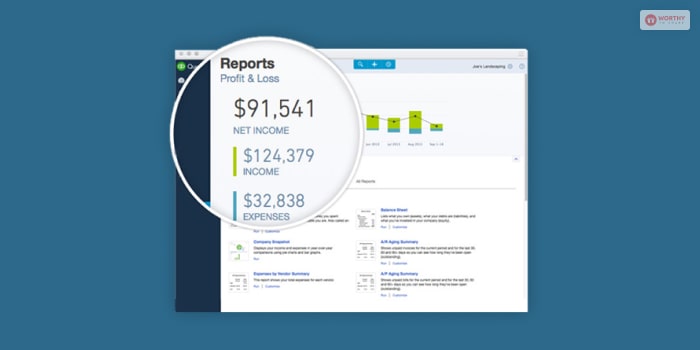Needing financial help for your business is pretty common. Whether it’s a short-term loan or a long-term one, having capital will make your business easier. This is where QuickBooks Capital comes in to provide you with various short-term financing options o grow your business.
With this article, you will learn about how the Quickbooks Capital offers services in different ways, be it marketplace or individual level! To grow your business, you have to find the right option to fund. The right provider will encourage you to get funding so that services can be given!
Learn more about them by reading this post below.
How Does QuickBooks CapitalWork?
QuickBooks Capital works similarly to Shopify Capital or PayPal Working Capital. Your application process gets sped up by automatically filling in your current information.
Installment loans, usually referred to as Intuit loans, are available here for terms of six, nine, twelve, or eighteen months. APRs from 9.99% to 34% put this firm’s rates with other competitive lenders.
Financial support from QuickBooks Capital is expensive, and you’ll have to repay your loan very fast. It may be a great source of quick cash. More so if you run a seasonal or newly established firm that would not be accepted elsewhere.
QuickBooks Capital Services
QuickBooks Financing provides revolving credit (also commonly called Intuit loans). These loans provide the borrower with a one-time cash payment. In return, the borrower is required to pay back the borrowed funds—known as the principal and interest—within the predetermined timeframe. The term “installments” refers to the regular schedule of payments.
The business also offers a lending platform, QuickBooks Capital Marketplace. Using this marketplace, you can be qualified for loans from one of QuickBooks’ finance partners. This will be helpful if you are not qualified for a QuickBooks Capital loan. To establish your eligibility, QuickBooks will utilize data from your QuickBooks account.
QuickBooks Capital Qualifications
The minimum requirements for QuickBooks personal loan to business loan are:
- Have a business that is at least six months old.
- Your personal QuickBooks line of credit or credit score should be more than 620.
- Your business generates at least $50,000 in revenues annually.
- You should be a pre-existing QuickBook Online user.
- Have not faced any form of bankruptcy in the last two years.
QuickBooks Capital Rates
The capital loan rates of this firm are:
- Borrowing Amounts: Minimum $5,000 to maximum $150,000
- Total Term of loan: Starting from 6 months and ending at 18 months.
- Total Interest Rates: Between 2.6% to 29%
- Origination Fees: Not required
- APR: Between 9.9% to 34%
- Collateral Guarantee: Personal Guarantee
Installment loans from QuickBooks Capital are available with terms of six, nine, twelve, and eighteen months. The loan term, your personal credit history, and the total amount all affect the interest rate. The amount your company may borrow varies depending on the financial health of your company. It might be as low as $5,000 to as high as $150,000. The company does not demand security, but it does want a guarantee. It’s in the form of a declaration that in the event your company files for bankruptcy, you will individually repay the loan.
Since this firm provides installment loans, you may reduce your interest expenses by repaying your loan before the agreed-upon deadline. There is no penalty for early payments. Your company bank account is debited for payments through ACH transactions every week or month.
QuickBook Capital Application Process

By going to the Capital tab in your QuickBooks account dashboard, you may start the application process directly from QuickBooks. Most of the program is auto-filled using data from the firm. All you need to do is double-check the accuracy of the data and complete any gaps. Most of the time, no further paperwork is required. In a maximum of three days, customer service will normally respond.
Only a soft credit check, which has no impact on your credit score, will be performed by QuickBooks Capital. When you send a loan application, there can be a minor influence on your company’s credit history.
You can pick from a variety of borrowing amounts if you are granted approval. The next day or two are typically required for the money to be placed into your bank account. To serve a capital account, you have to record personal money which can be used to pay bills along with starting businesses.
There was also an option of receiving funds be it from owners or partners! You will learn how to track the capital so that you can evaluate the total so that you can repay the investment.
QuickBook Capital Reviews: What Customers Have To Say
Although QuickBooks Capital has a Better Business Bureau (BBB) rating of A+, it has resolved over 2,000 complaints in the past three years, the website does not specifically include issues regarding the firm. Only some of the complaints actually mention the company. Instead, they focus on problems regarding QuickBooks and its relationship with TurboTax.
QuickBooks Capital should not be your choice if:
- Looking for long-term capital loan periods.
- If you need loans of more than $150,000.
- If you don’t plan to use QuickBooks on a regular basis.
QuickBooks Capital should be your first choice if:
- You want easy and quick approval.
- Get all the capital you need as quickly as possible.
- Looking for a good opportunity to grow your business?
Frequently Asked Questions (FAQs):
Entrepreneurs have a few questions regarding QuickBooks Capital, like
Ans: It’s not that difficult to get loans from QuickBooks. You only need to have a capital score of 620, which is a pretty moderate number.
Q2. Where Do You Put Capitals In Quickbooks?
Ans: To put your capital in QuickBooks accounts, you need to use the QuickBook Online program and use the “Make a Deposit” option through it.
Q3. Is It Worth Being QuickBooks Certified?
Ans: Yes, a QuickBooks certification can be used by many firms to evaluate your credit score. Therefore, as an entrepreneur, it’s important that you get the certification.
The Marketplace Of QuickBooks Capital
The QuickBooks Capital allows you to use QuickBooks Online or QuickBooks Desktop hence, providing as much service as possible. With the financial partners of QuickBooks Capital, there is a lot of information that has surfaced.
People negotiate in the market especially when it comes to curated partners along with the funding options. The line of credit, term loans and other aspects can be shopped especially when it comes to make people more able to compare rates along with credit without any hidden fees.
The Dos & Don’ts of Taking Out a Loan
A loan facility is a financial decision you must make carefully, no matter how many promises the loan providers make.
On one hand, it can provide temporary relief from urgent needs. This is why haste can make things even more difficult. Allowing you to be impatient.
You must remember there are responsibilities and long-term implications associated with availing a loan.
Therefore, we have created a list of dos and don’ts which can ease your decision-making.
1. Do Determine Your Needs
First, before obtaining any type of loan, you should understand the necessity of your loan.
For what?
Are you caught off guard and need the money urgently to improve your house, or is it more long-term, like starting a business venture?
Being aware of your requirements will allow you to choose the loan type that perfectly matches your requirements. This will also prevent you from getting a higher amount, which is more than you can afford.
2. Do Research for the Best Deal
The financial industry is saturated with numerous lenders offering different kinds of loans. Therefore, it is imperative to do some research.
Don’t be estate. This is the time to engage in a comparative review of the different providers.
If needed, create a pros and cons list as well.
Your research should include interest rates, repayment periods, fees, and other factors influencing the repayment burden (loan).
3. Do Check Your Credit Score
Your credit score heavily influences your loan application and the rate of loan interest you will get.
To qualify for a loan, you should review your credit score first. If it is not current, it is time to consider strategies to boost it as soon as possible.
Plus, if you are planning to look for another loan again, it is time to keep up with your credit. Pay your bills in time!
4. Do Understand the Terms and Conditions
Remember to read the loan agreement fully and understand all the terms and conditions before signing it.
Asking questions can clarify some things; if you still have doubts, you can seek professional advice.
5. Do Consider Alternative Options
Although a traditional bank loan could be a good option for some people, it is not the most favorable option for all.
Other sources, like credit unions or internet lenders, offer less interest or more forgiving repayment timelines.
Don’ts of Borrowing
Here are some of the common don’ts when taking a loan.
1. Don’t borrow more than you can afford
One of the biggest pitfalls you can overlook is borrowing a larger amount of debt than you can repay on time.
It can be tempting to borrow large amounts of money to fulfill immediate needs, but excessive borrowing can lead to financial distress.
Do not be myopic in your approach. Any form of non-repayment can lead to your account being on the default list. Your affordability and modern demands are the most crucial factors to consider. So, only borrow the amount that you are sure you can repay.
2. Don’t rush into signing any documents
When signing the loan papers, take a few extra minutes to understand what each section says and ask any questions if something is unclear. Ensure that you read all the terms and conditions, which cover the interest rates, fees, date of starting repayment, penalties for late or early repayment, etc.
Ask a professional financial advisor to look through the contract; do so with extra caution.
3. Don’t overlook hidden fees
Many loans contain hidden fees, such as lending, processing, or prepayment fines.
You might face these scruples if you are taking a loan from a private or internet loan provider.
Especially when the loan provider is not upfront.
Be on high alert regarding these matters, and always ask about unforeseen costs you might not have agreed to.
Direct Loans By QuickBooks Capital
QuickBooks Capital has successful customers especially with the short term working capital loan. When there are aspects of current liabilities, business credit history along with personal credit history and others are discussed so that they are considered to qualify for the funding.
According to the report of the past year, it has been observed that $50,000 in revenue has been earned especially if you look for a FICO of 580 and above. The personal credit history is pulled at times when it implements the personal score or credit of a user.
Final Verdict: Is QuickBook Capital Worth It?
Existing QuickBooks users who want a simple application process and quick funding can consider QuickBooks Capital loans. If a company has a fair credit rating and enough income to cover loan payments, it may be eligible for funding. Additionally, a QuickBooks loan might assist you in raising your company’s credit rating. Loans from the firm are the best option for working capital and buying merchandise, but they might not be the best option for long-term requirements like business growth.
If you utilize other QuickBooks accounts and seek a short-term loan, a QuickBooks Capital loan is unquestionably something you should take into account. However, you’ll need to search elsewhere if you’re looking for a loan with longer-term durations or higher borrowing quantities.
| PROS | CONS |
| a. The application process is easy. b. You receive funds within a few days. c. No originaatiion fees are required. d. You don’t receive pre-payment penalties. | a. You must have other pre-existing QuickBooks accounts. b. Only short-term loans are available. c. Poor customer service. d. Services are only available in limited states. |
Read Also:



















